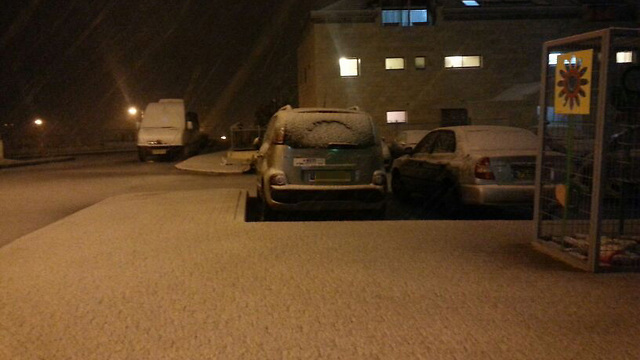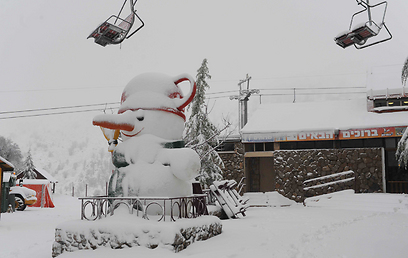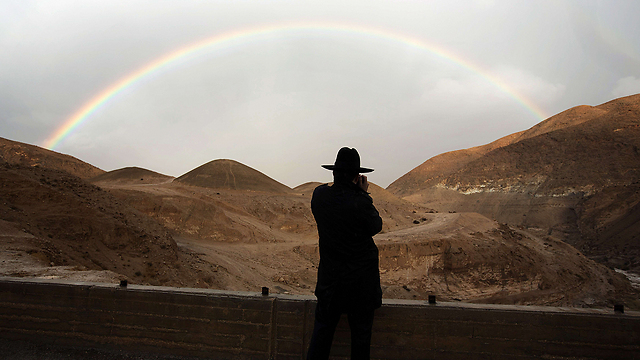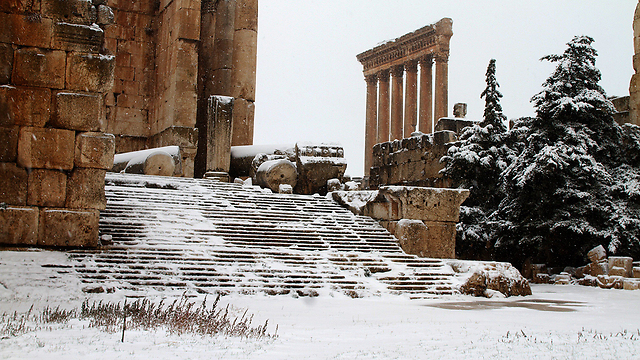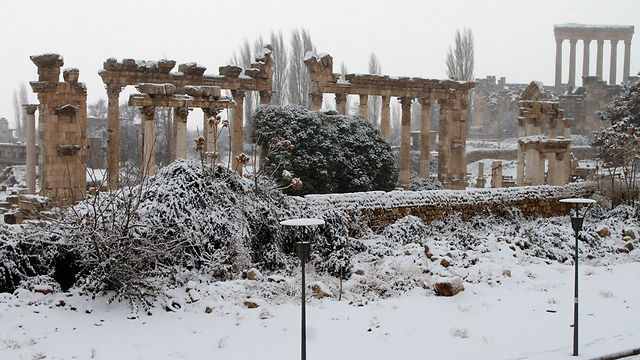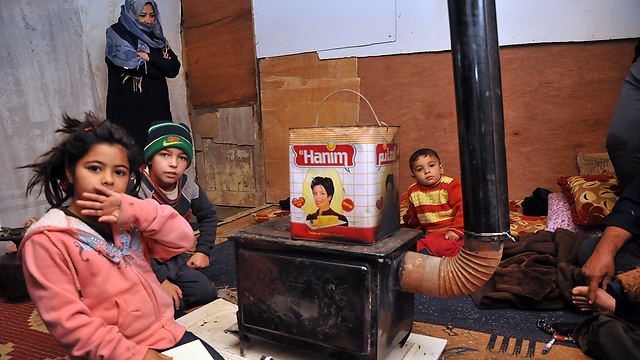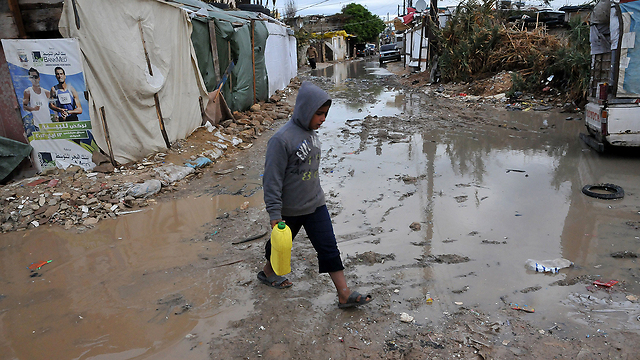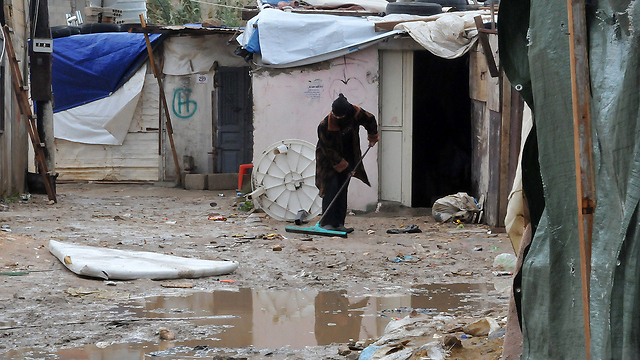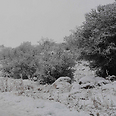
Snow hits Golan, Lebanon, Syria as Israel braces for storm
Snow begins to fall in Golan as Jerusalem braces for snow storm. Meanwhile, refugee camps in Lebanon, Jordan ill-equipped for coming winter. From Beirut to Tel Aviv, rain slowly turns to snow
Massive snow is already being felt in Syria and Lebanon – where it threatens thousands of homeless refugees – and is expected to hit Israel Wednesday night with snow expected in Jerusalem.
Related stories:
- Flooding in Tel Aviv, snow in Mount Hermon
- Israel: In the eye of the storm
- Chief rabbis: Pray against drought
A light layer of snow covered parts of the Upper Galilee and the north end of the Golan Heights early in the night. In the meantime, the Jerusalem Municipality enlisted 10 snow-ploughs in anticipation of the storm in addition to a slew of tractors and salt dispensers.
While the wintry weather has not hit the capital yet, cities across the lower end of the West Bank - Hebron, Kiryat Arba - have been softly blanketed by snow.
In addition, a special command center has been opened and a special meeting has already been set for 5 am in a bid to decide whether schools will open as planned. The LightRail will operate as usual, with cars running without passengers throughout the night in a bid to prevent snow from piling on the rails.
If current estimates come true, Jerusalem's park will be overflowing Thursday with visitors swarming to see the capital painted white. Leo, a ten-year-old from the city, told Ynet that "I want a lot of snow to fall so I can go and play like last year. I'm not planning on going to school tomorrow. I'm almost ready for the snow – I have everything but my gloves."
The season's first snow has already settled in parts of Lebanon on Wednesday and refugee children who have fled the war in Syria took the opportunity to have a snowball fight outside their tents.
But the worst of winter is yet to come for 2.2 million refugees living outside Syria and millions more displaced inside the country.
A storm named Alexa is sweeping across Syria and Lebanon, bringing with it high winds and freezing temperatures - and marking the beginning of the third winter since the Syrian conflict began in March 2011.
Two people have died and 14 others were injured due to the snow storm. “Two people have been killed so far due to the ‘Alexa’ storm and a family who was trapped in the snow in Akkar was evacuated,” Red Cross Secretary General George Kettani said on Wednesday.
Kettani also said earlier in the day that nine car accidents took place on the northern coastal line which left 14 people injured. A winter storm began Wednesday in Lebanon with snow blanketing the Beqaa and mountain areas as frigid temperatures settled over the country, while harsher weather is expected in the coming days.
The snow wreaked havoc across the region and grounded the start of a humanitarian airlift that was meant to start bringing supplies from Iraq into the northeastern Kurdish areas of Syria, where tens of thousands of people have been out of reach.
In a tented settlement a few kilometers (miles) from the border in Lebanon's Bekaa Valley, more than 1,000 people live in rudimentary shelters.
Refugee Ibrahim, 27, spoke to Reuters in his tent where the dirt floor had turned to mud and strong winds blew snow in the entrance. Children gathered in one corner around a fire in a metal crate.
"The storm will finish us. It's freezing now. I seek refugee in God," he said.
His family does not have enough money for food or to build a sturdier shelter.
Men filled bags with dirt to hold down tents and placed car tires and bricks atop the flimsy wooden structures to prevent the wind from tearing them apart.
In Lebanon, more that 835,000 refugees live in tented camps, unused buildings or with friends or family. The Lebanese government has decided not to house them in formal camps due to local sensitivities that they will stay permanently.
Aid agencies can help them with food, tents, blankets and clothes but they cannot set up formal refugee camps.
Ibrahim, who arrived last week, said the aid is not sufficient for the new arrivals.
"We came here in the winter but it would have been better if we had stayed in Syria. At least if you die, you die in your own house," he said.
Simon Ingram, a spokesman for the UN Children's Fund, said the agency has been able to mobilize winter supplies for Syrians in the country and its neighbors but "the needs will outstrip what we and our partners are able to provide."
The start of winter coincides with a polio vaccination campaign that seeks to vaccinate 750,000 children in Lebanon after an outbreak of the disease was confirmed in eastern Syria in October.
"Polio spreads through water and sewage," Ingram said. "This is one of the big dangers – overflowing drains."
Cold killer
Chief of Lebanon's Meteorological Department, Mark Whaybeh, said that in past years, snow and rainfall had increased and temperatures decreased over December and into January.
"We are still at the beginning of the season," he said. "We should have rain and cold periods during the next two months."
Whaybeh said Alexa will last until Saturday night and that temperatures could plummet to minus 7 degrees Celsius (19 degrees Fahrenheit) in some mountainous areas of Lebanon.
Minister for Social Affairs Wael Abu Faour said the government was "trying its best" and that the army had been called in to make refugee shelters ready for winter.
He told Reuters his main worry was that some refugees are living in a flood area near the Litani river.
Abu Faour said he was trying to rehouse refugees near the river, which flooded during storms in January but that so far there was no place available.
"It's beyond our capacity," he said. "We tried mosques, we tried schools, we have tried everything. It will be a disaster."
Snowfall in Syria has not halted the fighting between rebels and forces loyal to President Bashar Assad, which has killed more than 100,000 people in the past 2.5 years.
Snow in Homs
Shelling continued on Wednesday across the country, including in the strategic Qalamoun area between Damascus and the Lebanese border, activists said.
Footage filmed by opposition activists and posted to the Internet on Wednesday showed the corpse of a baby they said had frozen to death in the central Syrian town of Rastan. Reuters could not independently confirm the report.
The weather has also forced the UN to cancel an airlift announced Tuesday which aimed to deliver food and winter supplies from Iraq to northeast Syria.
"Qamishli airport (in Syria) has suspended all flights due to weather conditions, snow and poor visibility," UNHCR spokesman Dan McNorton said.
"We're not going to be able to make those flights happen until the weather improves," he said.
Roi Kais and Reuters contributed to this report
- Receive Ynetnews updates directly to your desktop










